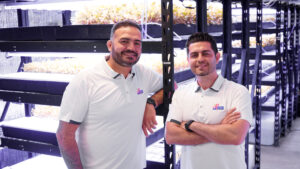The team at UP Vertical Farms has spent the last several years researching and developing the latest technology to grow crops at 350 times the yield of conventional farming
 Oppy Ups the Ante With First Vertical Farming Partnership
Oppy Ups the Ante With First Vertical Farming Partnership

News from | Oppy
UP Vertical Farms™ is a cutting edge new indoor farm leading the way with the upcoming launch of Canada’s first touchless, high density indoor vertical farm for growing customizable baby leafy greens. Founded by Fresh Green Farms, the company plans to unveil the first phase of operations in the spring of 2022 with the goal of becoming the world’s largest and most sustainable vertical farm by 2023.

In an industry grappling with many challenges, from climate change impacting crops, labor shortages and rising fuel costs effecting food prices, to food safety concerns, traditional methods of farming are proving to be more challenging every day. That’s why the team at UP Vertical Farms has spent the last several years researching and developing the latest technology to grow crops at 350 times the yield of conventional farming, while employing the most advanced, high density growing solution with minimal impact on the environment.
“Vertical farming is the future of agriculture and we’re excited to take it to the next level to bring better tasting and longer lasting greens to consumers everywhere by next year,” said Bahram Rashti, co-founder of UP Vertical Farms. “Our fully automated system will revolutionize the industry by allowing for much higher yields, quicker production and better quality control to produce locally grown greens in the most sustainable way.”
UP Vertical Farms will roll out the first phase of operations in B.C.’s Lower Mainland in the spring of 2022, anticipating production of just under 1 million kilograms — or 6.3 million bags — of salad greens per year. Further expansions through 2023 will essentially quadruple the total volume, making UP Vertical Farms the largest vertical farm in the world.
As Canada’s first hands-free vertical farming operation, UP Vertical Farms will be fully automated from seeding through to harvest in a humidity, temperature, water, light and nutrient-controlled environment that ups the quality of each and every plant. At UP Vertical Farms, leaves will never be touched by humans. Unlike traditional field greens they are grown in a controlled indoor environment in water, not soil, eliminating the need for chemicals to safeguard crops.
Most importantly, UP’s high density vertical farming solution is a Canadian innovation for a more sustainable future and a heathier planet. UP Vertical Farms uses 99% less land, 99% less water, 99% less fertilizer, and 95% less plastic for packaging to produce over 350 times greater yield, using zero pesticides for locally grown greens. Additionally, UP’s crops will be grown year-round in a 13 to 21-day growing cycle using recycled CO2 and proprietary lighting technology for custom brix levels and flavor profiles.
“We are excited to be entering the vertical farming space and bring fresh innovative options to our retail partners,” said Executive Director of Greenhouse and Canadian Category Development Aaron Quon. “Bahram and Shahram Rashti are committed to bringing the freshest, most advanced and sustainable technology to controlled environment agriculture. We’re thrilled to partner with them.”
From arugula to butter lettuce, UP’s delicious and nutritious, ready-to-eat greens will come in a variety of blends for salads, dishes, sandwiches and garnishes. UP Vertical Farms also has the unique ability to fully customize packs specific to the individual needs of retailers and restaurants. Because crops are grown in an automated 13 to 21-day period, blends can be tailored and grown instantaneously to keep pace with ongoing trends and adds to the quality and consistency only UP can deliver to its partners. Consumers will be able to purchase UP super greens from a range of retailers through its partnership with Oppy in 2022.
The content & opinions in this article are the author’s and do not necessarily represent the views of AgriTechTomorrow
Comments (0)
This post does not have any comments. Be the first to leave a comment below.
Featured Product

